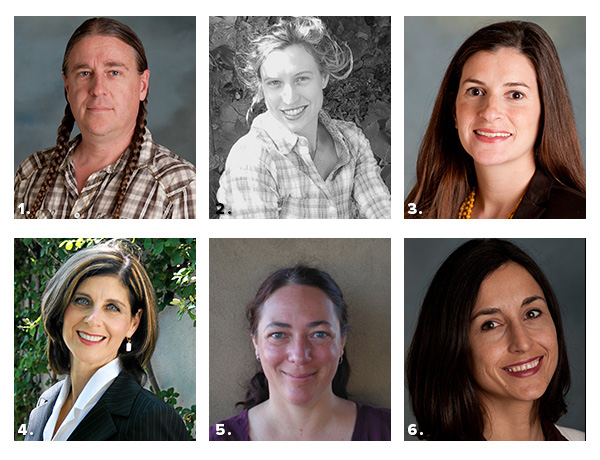

Six faculty members have been selected for the California State University, Northridge Research Fellows Program for the 2014-2015 academic year in support of their research and academic development in their fields of study. Top (left to right): Susan Auerbach, Maia Beruchashvili, Vibhav Durgesh, Martha Escobar, Ellen Jarosz. Bottom (feft to right): Brian Burkhart, J’aime Morrison, Ani Nahapetian, Carrie Rothstein-Fisch,Hélène Rougier and Cristina Rubino.
Examining morals and ethics from an indigenous philosophy, cellphone security and how culture impacts problem-solving and learning are all topics under investigation by faculty selected for California State University, Northridge’s Research Fellows Program for the 2014-2015 academic year.
The program, founded in 2007, was created and is funded by the Office of the Provost — and administered by the university’s colleges and the Delmar T. Oviatt Library — to offer faculty an opportunity to pursue compelling research or a creative activity.
“The Research Fellows program’s significance is that it allows the selected faculty the time to expand their existing work or begin new creative projects both on their own and with colleagues across the research space,” said Marianne Afifi, former associate dean of the Oviatt Library and the program administrator. “CSUN, as well as the research community at large, benefit from these endeavors as they shed light on the exciting work that these faculty members embark on.”
Six research fellowships were awarded last year, based on the extent that the proposed activity explores creative or original concepts; the likelihood of achievement of the stated outcomes in the proposed time frame; the benefits of the research or creative activity to society; the organization of the proposal; the ability to disseminate the results widely to advance understanding; and the contribution to the field of study or across other fields.
Research fellows are required to present their findings at a colloquium in the fall. The selected research fellows and their respective projects are:
Brian Burkhart (College of Humanities) – Burkhart, faculty in the American Indian Studies program, will focus his research on the “American Indian/Indigenous Philosophy and Environmental Ethics.” His goal is to reshape the way society thinks about the environment and create a different context for how human beings think about what is moral in environmental ethics, animal ethics and the like. In presenting an indigenous philosophy of the environment, he must counter the deeply held stereotypes of native people’s relationship to the environment as something animalistic and magical, and not rational and reasonable. He has been teaching at CSUN since 2010.
J’aime Morrison (Mike Curb College of Arts, Media, and Communication) – Morrison, faculty in the Department of Theatre, will develop a theater piece based on the history of Los Angeles. Her research will involve “performative research,” a way of engaging with history, landscape and memory that includes texts, documents and images but also involves site visits to downtown Los Angeles and other historic areas. She has been teaching at CSUN since 2001.
Ani Nahapetian (College of Engineering and Computer Science) – Faculty in the Department of Computer Science, Nahapetian’s research will focus on “Mobile Sensing-Based Stealth Computer Monitoring.” She will examine mobile system security and use sensors, readily available on most mobile devices — namely accelerometers, microphones and ambient light sensors — for the recovery of users’ computer usage activity with keyboard, mouse and screen emanation sensing. She has been teaching at CSUN since 2011.
Carrie Rothstein-Fisch (Michael D. Eisner College of Education) – Rothstein-Fisch, a professor in the Department of Educational Psychology and Counseling, will focus on “Connecting Cultures: Problem-solving in Science, Technology, Engineering and Math (STEM).” It will examine the framework of individualism and collectivism in exploring how teachers can use knowledge of students’ home culture to shape their curricula. She will be using an ethnographic approach. She has been teaching at CSUN since 1986.
Hélène Rougier (College of Social and Behavioral Sciences) – Faculty in the Department of Anthropology, Rougier’s research is titled, “Saint-Césaire (France): Reassessment of a Prominent Neanderthal Site.” She plans to re-examine and sort the faunal collections from the site of Saint-Césaire, in southwest France, to check for the presence of Neanderthal remains that may have been overlooked. Her project has the potential to shed new light on the disappearance of Neanderthals and their replacement by early modern humans, our direct ancestors. She has been teaching at CSUN since 2009.
Cristina Rubino (David Nazarian College of Business and Economics) – Department of Management professor Rubino will focus her research on “What Do You Bring to the Table? Examining the Role of Personal Resources in Various Work Contexts.” Her goal is to expand employee well-being and diversity research by investigating how individual factors help employees manage stressful situations that can contribute to strain, burnout and turnover. She has been teaching at CSUN since 2011.